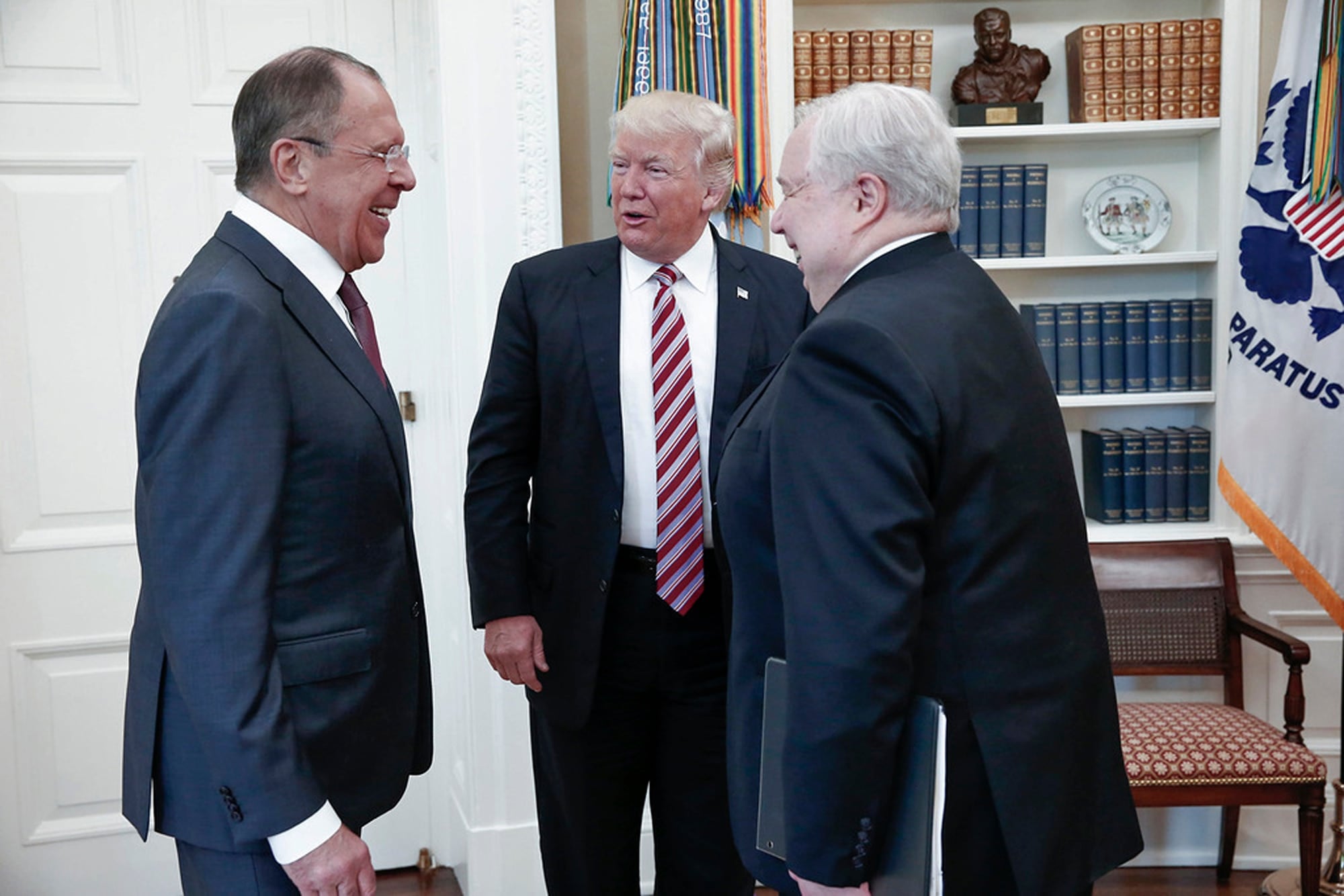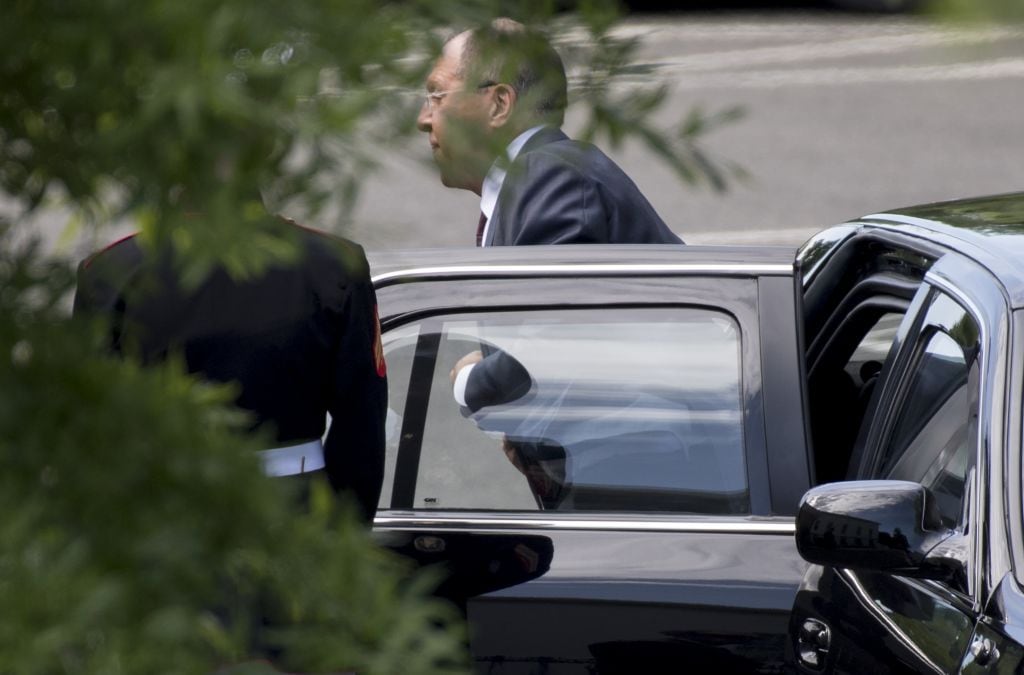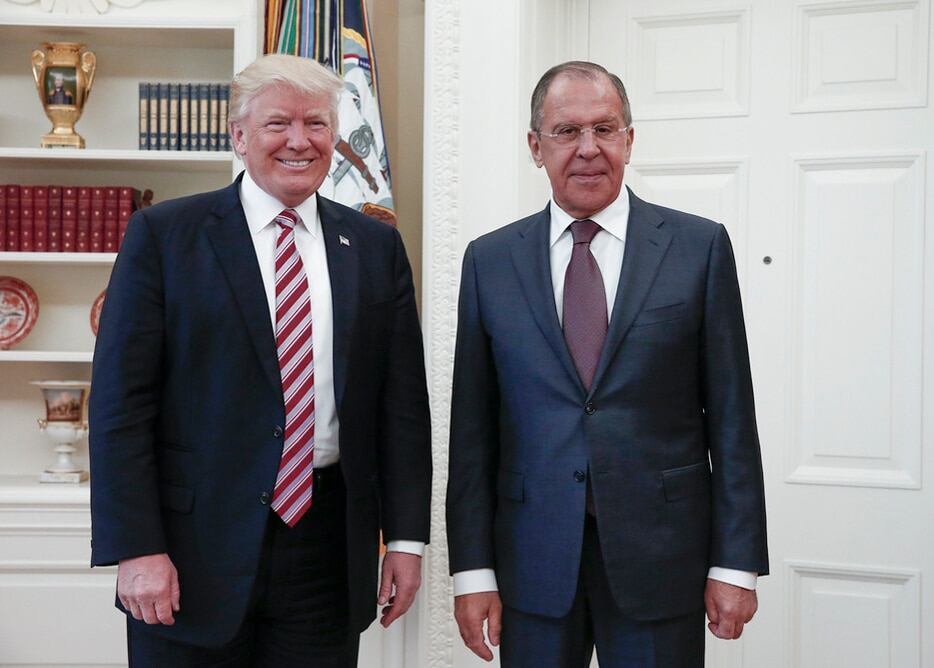WASHINGTON — All but ignoring the unfurling drama over Russia and the U.S. election, President Donald Trump on Wednesday sought to advance prospects for cooperation between the former Cold War foes in Syria and elsewhere in a rare Oval Office meeting with Vladimir Putin's top diplomat.
Foreign Minister Sergey Lavrov's talks with Trump were already destined to be a closely watched affair, given the dire state of U.S.-Russian relations and diplomatic wrangling going on over a Moscow-backed deal to stabilize Syria. Yet Trump's stunning decision on the eve of the meeting to fire the FBI director overseeing a Russia-related investigation injected further intrigue into Lavrov's first visit to Washington since 2013.
Trump "raised the possibility of broader cooperation on resolving conflicts in the Middle East and elsewhere," according to a White House statement.
Trump and Lavrov met in private, though both sides cast the session as a sign of ties having improved since the U.S. leader's assessment of them last month as at an "all-time low." On Wednesday, they focused on areas of budding agreement and Lavrov sought to blame the recent acrimony on former President Barack Obama.
"The previous administration bent over backwards to undermine the solid foundation of our relations," Lavrov told reporters at the Russian Embassy after meeting Trump. "We have to start at a very low level."
In contrast, he credited Trump and Secretary of State Rex Tillerson, whom he met earlier in the day, with taking a "businesslike" approach that is "free from ideology," focused on reaching agreements. None were apparently reached Wednesday.

President Donald Trump meets with Russian Foreign Minister Sergey Lavrov, left, and Russian Ambassador to the U.S. Sergei Kislyak at the White House in Washington, Wednesday, May 10, 2017. Trump on Wednesday welcomed Vladimir Putin's top diplomat to the White House for Trump's highest level face-to-face contact with a Russian government official since he took office in January.
Photo Credit: Russian Foreign Ministry Photo via AP
The meeting was Trump's highest level face-to-face contact with a Russian official since taking office and in itself represented modest progress. The last time Lavrov visited the American capital was before Russia annexed Crimea from Ukraine and intervened militarily in Syria to help President Bashar Assad — actions that fueled U.S.-Russian tensions.
The Russian diplomat steadfastly refused to weigh in on Trump's decision to fire James Comey, the former FBI director, who had been overseeing investigations of alleged Russian interference in the U.S. election and possible collusion by Trump's campaign. Lavrov called it a U.S. decision, echoing Putin, who said Russia had nothing to do with Comey's dismissal.
"Was he fired? You're kidding," Lavrov said sarcastically, feigning surprise as he started his day of meetings in Washington.
Comey's dismissal escalated concerns in both parties that Trump may be trying to undermine an investigation that appears to be gaining steam. Trump insisted that wasn't the case. He said Wednesday he fired Comey because he "was not doing a good job."
Still, the overlap between the investigation and Trump's diplomatic efforts made for uncomfortable optics. Russia's Foreign Ministry tweeted a photo of Trump shaking hands with Lavrov and the Russian Embassy posted another of the president greeting another participant in the meeting: Ambassador Sergey Kislyak, a central character in various Russia-related investigations because of his contacts with several individuals close to Trump.
Lavrov chalked up the controversy to "noise" and to "false news" — invoking Trump's frequent references to the Russia allegations as "fake news."
On Syria, where Russia has backed President Bashar Assad's forces and the U.S. has supported anti-Assad rebels, the talks appeared to indicate a slight narrowing of differences.
Russia, Turkey and Iran last week agreed on a plan for four "de-escalation zones" in the Arab country to quell a civil war that has killed some 400,000 people and contributed to global refugee and terror crises since erupting in 2011. The U.S. isn't party to the deal and has reacted cautiously, especially given its misgivings about Iran's role.
But Lavrov said he detected a U.S. willingness to participate, especially with a zone being formed in Syria's south, near the border with Israel and Jordan.
"We believe the U.S. is really interested in that," Lavrov said, acknowledged details of the plan still needed to be worked out. The zones would not cover areas where the U.S.-led coalition is fighting the Islamic State group, but enforcement and other questions remain unanswered.

Russian Foreign Minister Sergei Lavrov arrives for a meeting with US President Donald Trump at the White House in Washington, DC, on May 10, 2017.
Photo Credit: Saul Loeb/AFP via Getty Images
In his earlier meeting with Lavrov, Tillerson emphasized the U.S. wouldn't lift sanctions on Russia related to Ukraine until Moscow reverses the actions that triggered the punishment — namely, its Crimea annexation.
Moscow wants the elimination of those and election-related sanctions imposed by Obama. Nevertheless, Lavrov struck a conciliatory tone and said Russia isn't intending to retaliate.
"Putin doesn't want to follow the lead of those who are trying to poison our relations to the point of no return," he told reporters.
AP White House Correspondent Julie Pace in Washington and AP writer Vladimir Isachenkov in Moscow contributed.



